Social Protection
Context
The State of the World’s Cash 2020 report found:
- Working with, through and alongside social protection systems is now considered key to strengthening the humanitarian-development nexus and humanitarians are increasingly active in this space
- Practitioners find that the three biggest challenges to effective linkages are: (i) lack of coordination between the actors involved, (ii) social protection systems are not designed to respond to crises, (iii) humanitarian practitioners lack expertise in social protection
- Critically, there is no ‘one size fits all’ solution to linking CVA and social protection. Trade-offs between efficiency, effectiveness, accountability, and sustainability must be considered to ensure the best outcomes for people living in crisis and depends on context, existing systems, and timeframe. Linking will not always be appropriate and social protection systems may not meet all needs. In many contexts, in the short to medium term at least, humanitarian programming will be required to fill gaps.
Current Priorities
The CALP Network has invested intensely in this thematic area over the last few years. We will continue to work closely with the SPIAC-B Working group on linking humanitarian (cash) assistance and social protection (formerly the Grand Bargain Sub-Workstream on Social Protection) and with the SocialProtection.org platform and the Online Community Social Protection in Crisis Contexts to develop evidence, produce capacity building materials and provide technical support to coordination actors.
Community of Practice
SocialProtection.org hosts a dynamic and collaborative online community of practice (CoP) bringing together individuals from diverse backgrounds interested in expanding social protection in crisis-prone areas. The CoP offers a space to exchange documents, insights, and news in order to progress and learn together. Its inclusive and member-led approach offers organisations and individual members a forum to increase learning and outreach, facilitating the exchange of experiences and expanding knowledge. A discussion group hosted by dgroups.org complements these activities by connecting users rapidly via email.
SPACE
There are a wealth of relevant resources from ‘Social Protection Approaches To Covid-19: Expert Advice’ (SPACE) published in the CALP library.
Featured content

Linking Social Protection and Humanitarian Cash and Voucher Assistance
Report
There is a growing momentum and body of work around the idea of developing stronger links between humanitarian cash and voucher assistance (CVA) and social protection (SP). This Briefing Paper for the CALP Network, based on a literature review, a survey, and interviews, is intended to inform the CALP Network’s overall approach in this area, and subsequently its capacity building and...

Linking Social Protection and Humanitarian Cash
Blog Post
The case for social protection to help people cope with shocks has always been clear and never more obvious than during the current Covid-19 crisis. These issues are currently playing out in real time as governments, donors and aid agencies scramble to find ways to get more help to more people to cope with the economic consequences of illness and lockdown. As the virus starts to take hold in...

Linking Social Protection and humanitarian cash and voucher assistance (CVA) – what do we really know and where to start? Findings from the CALP Network commissioned high level briefing paper at the time of COVID-19
Webinar
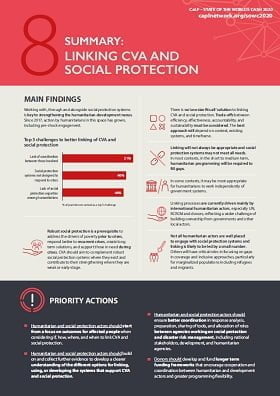
State of the World’s Cash 2020 Chapter 8 summary: Linking CVA and social protection
Report
Longstanding efforts to strengthen links between humanitarian CVA and social protection have been accelerated by the COVID-19 pandemic, with significant progress since the last report. CVA should aim to complement robust social protection systems where they exist and contribute to their strengthening where they are weak or early-stage. This chapter asks: ‘What opportunities and challenges...
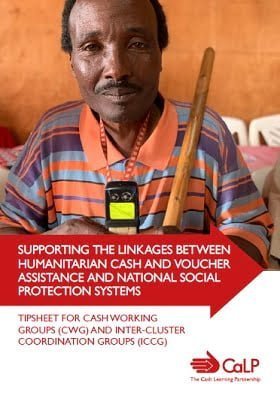
Supporting the Linkages Between Humanitarian Cash and Voucher Assistance and National Social Protection Systems
Report
This tipsheet aims to support country-level coordination efforts to strengthen the engagement between humanitarian coordination groups that implement cash and voucher assistance (CVA) and existing social
protection or disaster risk reduction coordination actors and groups. In particular, it seeks to offers inter-cluster and cash working group coordinators simple practical tips for engaging...
Case Studies

Linking CVA and Social Protection in the MENA Region – Crib sheet
Report
Building linkages between humanitarian cash and voucher assistance (CVA) and social protection (SP) has become an increasingly prominent topic over the past five years and the Middle East and North Africa (MENA) region has been at the centre of this evolution. The objective of this resource set (the crib sheet and 3, soon to be 6, regional case studies) is to ensure that the CALP Network...
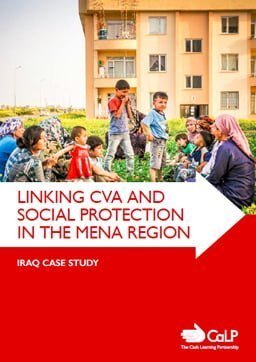
Linking CVA and Social Protection in the MENA Region – Iraq Case Study
Report
Building linkages between humanitarian cash and voucher assistance (CVA) and social protection (SP) has become an increasingly prominent topic over the past five years and the Middle East and North Africa (MENA) region has been at the centre of this evolution. The objective of this resource set (the crib sheet and 3, soon to be 6, regional case studies) is to ensure that the CALP Network...

Linking CVA and Social Protection in the MENA Region – Lebanon Case Study
Report
Building linkages between humanitarian cash and voucher assistance (CVA) and social protection (SP) has become an increasingly prominent topic over the past five years and the Middle East and North Africa (MENA) region has been at the centre of this evolution. The objective of this resource set (the crib sheet and 3, soon to be 6, regional case studies) is to ensure that the CALP Network...
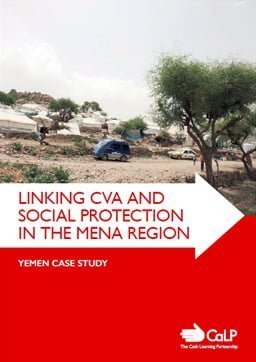
Linking CVA and Social Protection in the MENA Region – Yemen Case Study
Case Study
Building linkages between humanitarian cash and voucher assistance (CVA) and social protection (SP) has become an increasingly prominent topic over the past five years and the Middle East and North Africa (MENA) region has been at the centre of this evolution. The objective of this resource set (the crib sheet and 3, soon to be 6, regional case studies) is to ensure that the CALP Network...

Linking Cash and Voucher Assistance (CVA) and Social Protection – Occupied Palestinian Territories (OPT): Country Summary
Report
This country summary is part of a larger resource set, providing practitioners with examples of different approaches to linking CVA
and social protection.
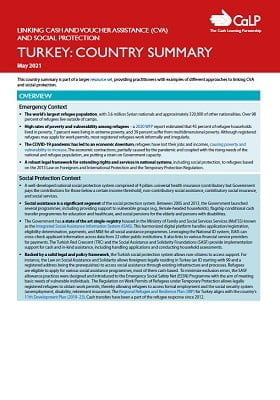
Linking Cash and Voucher Assistance (CVA) and Social Protection – Turkey: Country Summary
Report
This country summary is part of a larger resource set, providing practitioners with examples of different approaches to linking CVA
and social protection.
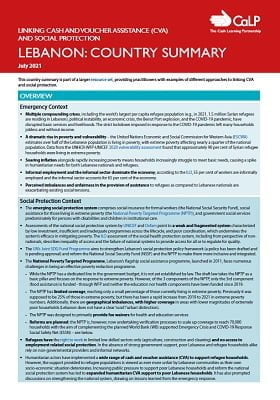
Linking Cash and Voucher Assistance (CVA) and Social Protection – Lebanon: Country Summary
Report
This country summary is part of a larger resource set, providing practitioners with examples of different approaches to linking CVA
and social protection.
Thematic lead
Latest

Linking Social Protection and Humanitarian Response – Best Practice
Report
This review looks at the alignment of humanitarian response in refugee crises with national social protection systems. It examines the experience of three countries dealing with protracted refugee situations: Turkey, Lebanon and Cameroon, and also identifies lessons from other literature. The number of...
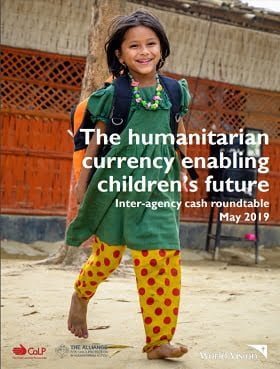
The humanitarian currency enabling children’s future – Inter-agency cash roundtable
Report
This summary report highlights key presentation insights, and recommendations from the CALP Network & World Vision co-hosted inter-agency Cash Roundtable, focusing on how CVA can be an enabler to promote child protection and child wellbeing, based on most recent research, case studies from across the...

Social cash transfers, generational relations and youth poverty trajectories in rural Lesotho and Malawi
Report
Report on an ESRC-DFID-funded three-year collaborative research project (ES/M009076/1) Social cash transfer schemes, which disburse cash to poor and/or vulnerable people, have proliferated across sub-Saharan Africa over the past two decades. There is growing evidence that these address symptoms of poverty...

End-line Survey Report: Cash transfers for rapid livelihoods recovery of volcano-displaced families in Vanuatu
Report
This report documents and analyses the results of an end-line survey of the cash transfer programme (CTP), “Cash Transfers for Rapid Livelihoods Recovery of Volcano-displaced Families in Vanuatu” in Sanma province between October 2018 and March 2019. The programme was implemented by Oxfam in Vanuatu...
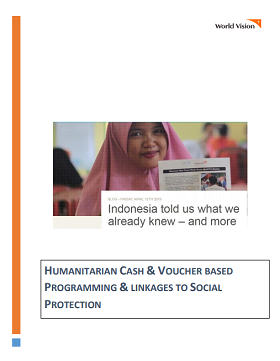
Humanitarian CVA & Linkages to Social Protection – Indonesia told us what we already knew
Report
Case study highlights linkages from disaster-response MPCA in Sulawesi/ Indonesia in 2018 to Child Sensitive Social Protection Programmes – key learnings and best practise. https://www.wvi.org/stories/disaster-management/indonesia-told-us-what-we-already-knew-and-more
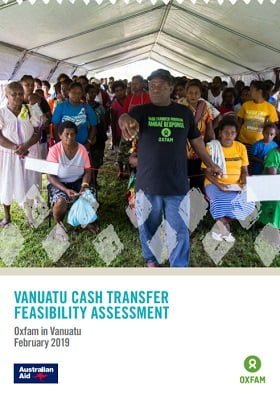
Vanuatu Cash Transfer Feasibility Assessment
Report
Oxfam conducted this Vanuatu Cash Transfer Feasibility Assessment in partnership with Youth Challenge Vanuatu, Department of Agriculture & Rural Development, and the Vanuatu National Statistics Office with funding from the Australian Department of Foreign Affairs and Trade (DFAT) through the Australian...
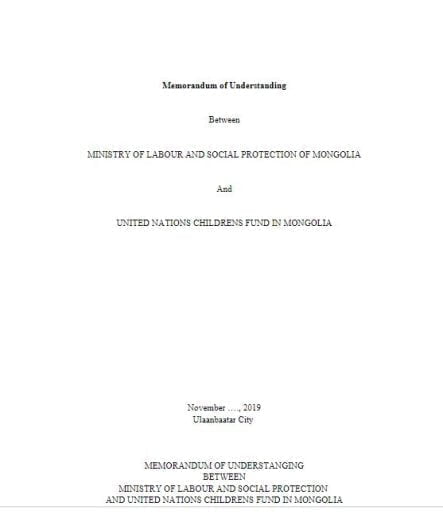
Memorandum of Understanding Between Ministry Of Labour And Social Protection Of Mongolia And Unicef
Guidelines and Tools
This Memorandum of Understanding (MoU) sets forth the terms and understanding between the MLSP and UNICEF Mongolia to collaborate to implement a Child-focused Shock-Responsive Social Protection (SRSP) Pilot (the Climate Emergencies Child Grant), which will be separate from but based on the implementation...

Analysis of social and power dynamics of stakeholders for the implementation of multi-year MultiPurpose Cash Transfers in North Mali
Report
Six INGOs (Hunger Against Action, Danish Refugee Council, Handicap International, Oxfam, Solidarités International and International Rescue Committee) have been implementing a MultiPurpose Cash Transfers programme in Mali; the second phase of this social safety net intervention targets the communes the...

Vanuatu Cash Transfer Feasibility Assessment – Report summary
Report
This is a summary of the findings of the Vanuatu Cash Transfer Program (CTP) Feasibility Assessment that was conducted to build a context-specific evidence base to guide preparedness initiatives related to the use of cash and vouchers as a means of humanitarian assistance for response, recovery and...
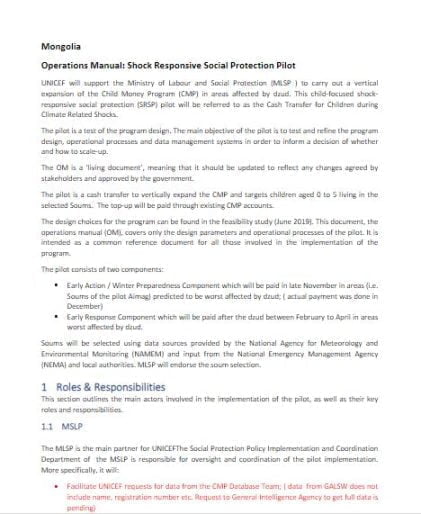
Operations Manual: Shock Responsive Social Protection Pilot
Guidelines and Tools
The pilot is a test of the program design. The main objective of the pilot is to test and refine the program design, operational processes and data management systems in order to inform a decision of whether and how to scale-up.

Introductory Research on the Feasibility of Cash and Voucher Assistance in Rural Fiji
Report
This report presents the findings of a study into the general feasibility of using Cash and Voucher Assistance (CVA) in responding to disasters in Fiji. The term “Cash and Voucher Assistance” or CVA, is used in the report in line with the the CALP Network definition, so it refers to programs where...

ESSN Programme Technical Analysis
Report
The Technical Analysis study has been conducted with the aim of referring the individuals in the ESSN Programme beneficiary pool to the livelihoods in terms of its scope and content. With the purpose of increasing beneficiaries’ economic and social resilience and self-sufficiency by reducing their...

Tripartite Agreement Template Between Government, Partner And Financial Service Provider For Provision Of Financial Assistance To Beneficiary Accounts
Guidelines and Tools

Cash transfer Programmes – Impact on Stunting and Financial Inclusion
Report
This report focussed on evidence published in the last ten years (since 2009) on cash transfer programs’ impact on stunting and financial inclusion. The importance of maternal education on stunting emerged from the literature and warrants further investigation, which was outside the scope of this...
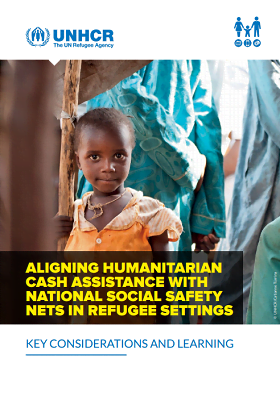
Aligning humanitarian cash assistance with national social safety nets in refugee settings
Report
UNHCR’s research on Aligning Humanitarian Cash Assistance with National Social Safety Nets in Refugee Settings – Key Considerations and Learning provides guidance on how operations have or could progressively align humanitarian cash assistance for refugees to national social safety nets and the...

Minimum Expenditure Basket Harmonization Guidance
Guidelines and Tools
The present Minimum Expenditure (MEB) Guidance is an operational tool for the Refugee Response to inform humanitarian multi sector and/or multipurpose cash assistance to meet food needs and a broader set of essential needs of refugees in Uganda.

Kızılaykart Cash Based Assistance, Information Note
Report
Following the first refugee wave in May 2011, refugees from Syria has continued to seek asylum in Turkey. As a result of the open-door policy between 2011 and 2015, Syrians were welcomed by the Turkish government and obtained legal status under temporary protection. Subsequently, Turkey is hosting more...

Quantitative assessment of the social assistance system of the Kingdom of Eswatini
Report
Analysis of social assistance needs, coverage of needs by existing programs and identification of social assistance gaps in Eswatini

The CALP Network-Asia Pacific Regional Cash Working Group learning event report
Report
On 20-22 May, 27 cash working group (CWG) coordinators and regional technical focal points convened from Afghanistan, Fiji, Indonesia, Laos, Myanmar, Nepal, Pakistan, the Pacific region, the Philippines and Vietnam to share experiences and strengthen coordination between country, regional and global...
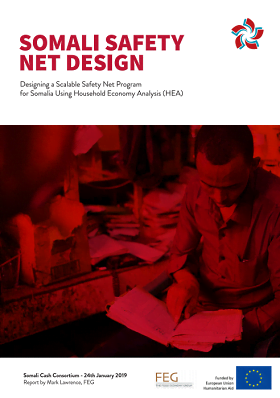
Somali Safety Net Design: Designing a Scalable Safety Net Program for Somalia Using Household Economy Analysis (HEA)
Report
The aim of the study was to use existing household economy analysis (HEA) data to help in the design of a scalable cash-transfer-based safety net program for Somalia. The study made use of a recently completed 15-year (30-season) time series analysis covering 13 livelihood zones in Somalia.

